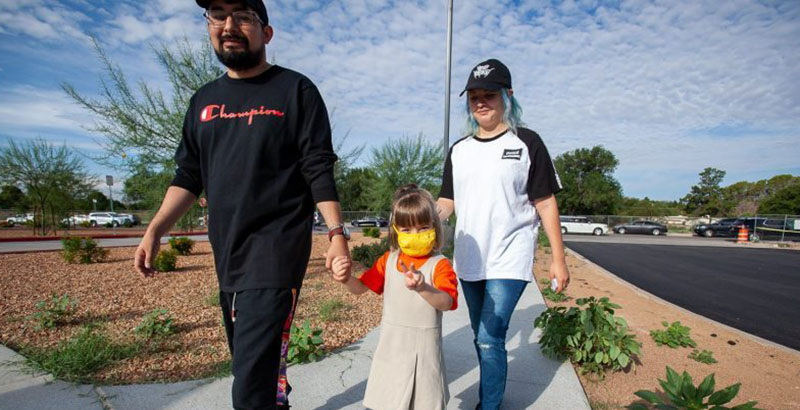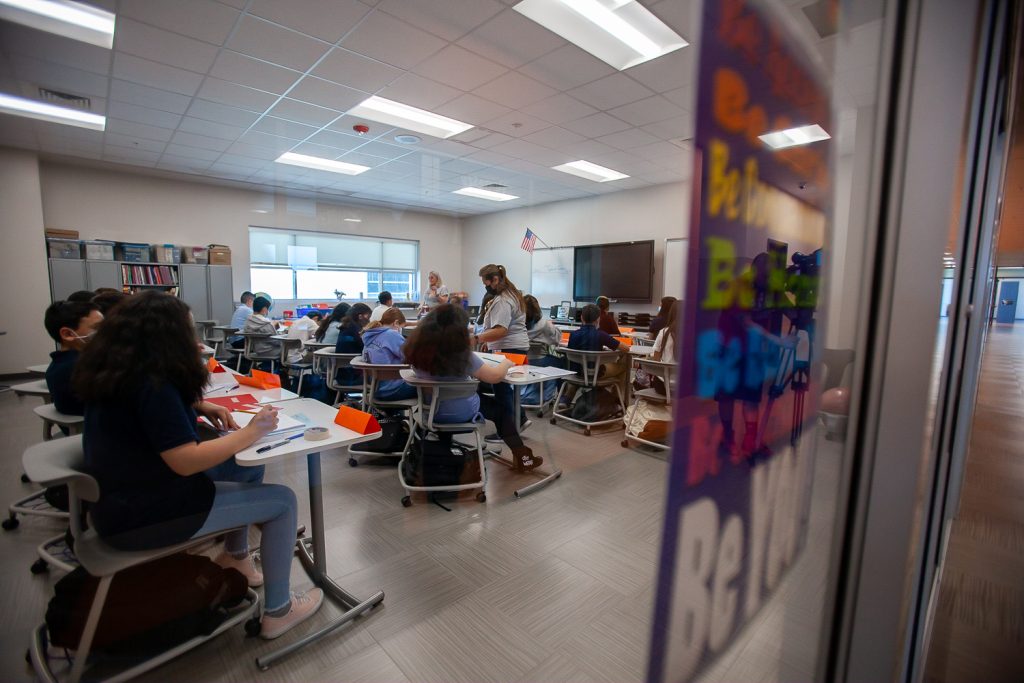Keeping Students (and Schools) Safe From COVID-19: Here’s What Parents Need to Know About Protecting Their Kids and Campus Communities

Get stories like this delivered straight to your inbox. Sign up for The 74 Newsletter
El Paso public school students are back on campuses after months of virtual instruction, a return that coincided with a rise in coronavirus cases in El Paso.
The delta variant is driving Texas’ case surge, and doctors are seeing more infections in children and more children being hospitalized.
Here’s what El Paso parents should know about how to protect their school-aged children from being infected with the virus:
Q: What should parents know about the delta variant?
The delta variant is twice as contagious for children and adults as previous COVID-19 strains, said Dr. Stanley Spinner, chief medical officer and vice president of Texas Children’s Pediatrics and Texas Children’s Urgent Care.
“Because of the contagiousness of the delta variant, even people that are vaccinated can get infected — they will either be asymptomatic or minimally symptomatic. But they can still spread the virus to those that aren’t protected, mainly our kids under 12,” Spinner said.
Q: Should children wear a face covering at school?
Texas doctors emphatically say yes. And that includes teachers and school staff.
The Centers for Disease Control and Prevention also recommends that students, teachers and school staff wear face masks, even if they are vaccinated.
Q: What can teachers do if children remove their mask during the school day?
Teachers cannot ask students to wear a mask because Gov. Greg Abbott forbade schools from requiring them, stressing the need for “personal responsibility rather than government mandates.”
El Paso districts have disposable masks on hand and can offer them to students who request them.
Q: Beyond masking, what else can students do to stay safe while at school?
Good hand hygiene can help protect students from becoming infected. Students should wash their hands before lunch, after using the restroom and before and after touching their face, said Jose Luis Salas, infection control director at El Paso Children’s Hospital.
Sharing food and drinks with their peers should also be avoided to minimize exposure and cross contamination, Salas said. And when possible, students should put a few feet of distance between themselves and their classmates.
Students should stay home from school if they have potential COVID-19 symptoms, such as a runny nose, sore throat or fever. They should get tested and not return to school until they receive a negative test result.
Q: Can parents find out whether teachers are vaccinated?
No. Districts are not collecting this information as the COVID-19 vaccine is voluntary and is not a requirement for public school enrollment or employment.
Q: How often should school-aged children be tested for COVID-19?
Students don’t need to be regularly tested for the virus, Spinner said. They should, however, get tested if they believe they were exposed to the virus. They must quarantine at home, away from others, until they receive a negative test result.

Q: What should parents of unvaccinated children do to keep their children safe?
Parents should wear a mask in indoor public spaces and keep their distance from others, regardless of whether they are vaccinated. That’s especially important now that the CDC considers El Paso County at “substantial” risk of community spread. Parents who have not yet been vaccinated should do so as soon as possible.
“Ultimately, defeating COVID is a team sport that’s going to require the highest number of people possible to adhere to masks, (and) in time the highest number of people to get vaccinated,” said Dr. Glenn Fennelly, chair of the department of pediatrics at Texas Tech University Health Sciences Center El Paso.
Mask wearing and vaccination prevent new variants from emerging that could be more contagious, more deadly and less responsive to the vaccine.
Q: Are Texas doctors seeing hesitancy among vaccinated parents to take their children to get the vaccine?
Less than a quarter of 12- to 15-year-olds in El Paso have been vaccinated against COVID-19, which Fennelly says is “concerning.” It’s not unusual for parents to be more cautious with their children, though the vaccine is just as safe for children as it is for adults, he said. Parents should speak to their pediatrician or family doctor about any concerns they may have.
“The most important thing they (parents) can do for their child’s safety is to vaccinate them to protect them” from the virus, Spinner said. When they don’t, they put their child at risk of serious infection and even death.
Q: What are the common COVID-19 vaccine side effects in adolescents?
The common vaccine side effects in adolescents are no different than the ones adults experience. These include soreness at the injection site, muscle aches, fatigue and fever, all of which typically last one to two days.
The risk of adolescents experiencing myocarditis and pericarditis — inflammation of the heart — are extremely rare.
Q: What is the status of the COVID-19 vaccine for children under 12?
The Food and Drug Administration likely won’t issue an emergency use authorization for the Pfizer and Moderna vaccines to be used in children ages 5 to 11 until late fall at the earliest.
This article originally appeared at El Paso Matters.
Get stories like these delivered straight to your inbox. Sign up for The 74 Newsletter

;)